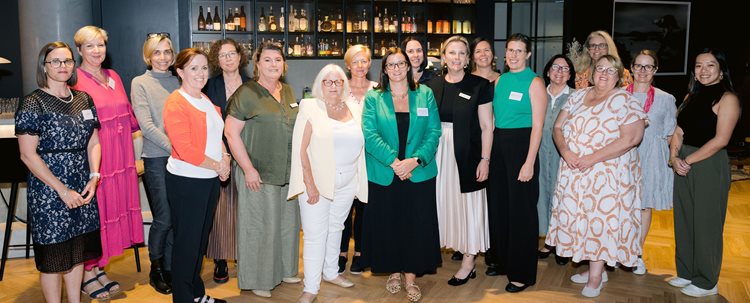The Minister for Education and Early Learning, Sarah Mitchell, met with a representative group of CELA members at our Sydney CBD office last Tuesday night. It was a unique opportunity for members to better understand how early education policy is being implemented before the state election. Both parties were invited to attend, and Minister Mitchell accepted our invitation.
CELA CEO Michele Carnegie facilitated a conversation around the key themes concerning the sector in NSW and enabled a dialogue that bridges policy decisions and implementation. Many questions were asked by the group of diverse members in attendance, amplifying the voices of our membership base.
Minister Mitchell expressed her passion for the sector and highlighted the enormous growth in the budget since she was first appointed. We were delighted to hear that she views her relationship with CELA as a partnership. The information and views provided by Michele Carnegie on behalf of members, together with a range of other sector representatives, have helped shape the development of many initiatives announced during her time in office, including the Liberal and Nationals $15.9 billion Early Years Commitment package.
“The policy covers our five advocacy pillars and is the result of many years of relentless advocacy in those areas,” commented Michele Carnegie. “While there is much enthusiasm for the placement and level of investment, challenges will arise during the implementation of such an enormous change.”

Key discussion topics included:
A strong theme of collaboration and co-design ran through Minister Mitchell's responses, with several requests made for input from members and stakeholders throughout the dialogue.
Workforce and pay:
Members asked a number of questions concerning workforce and pay, including where the educators will come from to staff the 500 new services that are being planned, and whether the NSW government would support increased wages for early educators.
Minister Mitchell said that there will be funds for increased wages. However, they are still figuring out what packages will be offered and where the funds will be drawn from. She stated that the government acknowledges that services can’t operate without staff and that wages and retention must be addressed. CELA CEO Michele Carnegie drew attention to the importance of pay and conditions and how this is likely to be achieved through enterprise bargaining.
“Different things will appeal to different people to keep them in the sector, so that’s why we need to co-design what that would look like,” said Minister Mitchell. “It's about making it more attractive for people to come in, but it's also about how we keep people who are already here, and there's money to do it.”
The Minister went on to say that her department is working with ECAG to look at some of the things they can do in this space. They are inviting input from the sector to ensure that the right measures are taken, whether that be a bonus payment, a retention payment, or a financial reward.
“We’ve [also] had people talk about better support for well-being and better professional development opportunities,” said Minister Mitchell, who confirmed that there is money allocated within the $280 million package and then, more broadly, as part of that $5 billion in the Childhood Childcare Affordability Fund.
A member noted that teachers and educators are concerned for their wages and frustration that they're not being paid equally to those in the primary school system and asked how this can be addressed.
Minister Mitchell agreed that there should be pay parity and there should be better recognition for the work that early childhood educators do.
“We also know it's important to raise the profile of the profession, and we know how important the early years are,” the Minister said. “I've certainly seen in the last twelve months more press conferences about early childhood than I've ever seen before. And that's not accidental. That's because we understand the impact that it has, but also the importance of supporting that public narrative around why the early years is so important and why the work that our early childhood educators do is equally, if not more critical, than what happens in the schools.”
Funding and service viability
Members asked a number of questions relating to viability, such as where existing preschools will sit in relation to pre-Kindergarten initiatives on school sites.
Minister Mitchell made it clear that the government doesn’t want services to be concerned about their viability because all services will be needed in order to provide the education and care being offered to children and families and that play-based learning will absolutely be at the heart of the approach. She noted that the government has looked at the projected enrolments into kindergarten in the years ahead, reviewed the capacity in existing services, and investigated where there is a need to add new services. Capital works will be made available, so existing services will have opportunities to add a room or two or expand.
“The model will be different in different communities in terms of the size of the service that we need to build, the number of children that will attend, and how you work in collaboration with a local provider who is already there,” said Minister Mitchell.
“We want to work with each community in order to build the best model to deliver that service...This is a chance for everyone in the sector to grow. We know at the moment we don't have enough capacity to give every child five days a week... And so this isn't about wanting anyone not to have the financial viability to keep going.”
Minister Mitchell noted that the goal is for children to start kindergarten the year that they turn six. Children would then begin their pre-K year the year they turn five, so before that would still be a need for preschool, long day care and family day care in the years leading up to pre-K.
A member enquired whether NGOs will be supported in implementing universal pre-kindergarten.
Minister Mitchell noted that the government wants all service types to be a part of this delivery to cater for expected demand, including NGOs.
"We want to do the same work that we've done with the public schools and actually come and have a look at what the need is and where the gaps are,” she responded. “...We need to do that homework with the non-government schools in the same way that we did it with government schools.”
Boosting leadership skills
Members noted that many educators have been promoted to leadership roles due to the staffing crisis without having had the necessary training to engage and lead a team properly. Questions were raised around how this could be addressed.
Minister Mitchell pointed out that there is a leadership institute in school education that provides support and training for aspiring leaders. She believes this type of initiative should also be introduced to the early education sector and has raised this with the Department of Education.
Preschool programs in long day cares
Members enquired how the government will promote the fact that LDC also provides the same preschool education as traditional preschools.
Minister Mitchell stated that there will be a continuation of fee relief in long day care services as well as preschool and that this will be needed due to the increased level of places that will be required. She also acknowledged that there is still a level of misunderstanding in the community about preschool programs within long day long day care services and that education is needed around this topic.
Governance
Having been on a committee for a community-managed preschool herself, Minister Mitchell understands the challenges involved with finding committee members, communicating the responsibilities involved, and the impact of the decisions they make (including on remuneration).
She noted that throughout the process, there will be opportunities to revisit what's effective, what's working, and how things can be improved, but that due to the history, it is a complex challenge.
Summary
Co-design and collaboration was a key theme, and your continued input will help to ensure that wide-ranging initiatives such as universal pre-Kindergarten are rolled out in a manner that balances what is operationally possible with what benefits children, families and communities.

Minister Mitchell acknowledged that many people in the sector are fatigued, particularly in light of the challenges faced during the pandemic, and that there is a desire for things to move quickly. However, she asked for understanding because the process is incredibly complex, and in order to implement it correctly, adequate time is needed for consultation. She commented that the money will start flowing very soon, and that will turn into tangible differences for your staff and your community.
With a state election coming up on March 25, the government is currently in caretaker mode, meaning there will be no new announcements from the government for the moment. However, the funding attached to the Early Years Commitment has been legislated. Labor has not foreshadowed any intention to repeal this if elected and has instead been relatively contained in its promises for early childhood. Labor’s strongest announcement is the building of 100 public preschools co-located on public school sites, and 50 preschools co-located on non-government school sites.
"The challenge for whoever wins will be to ensure the $15.9 billion budgeted over a decade is implemented effectively to maximise outcomes for all children and families," said Michele Carnegie. "This will not be an easy task in a sector characterised by complex funding, governance and delivery structures. CELA will continue to represent and involve members in all aspects of co design, providing a bridge between high level sector reform and practical implementation at service level."
Share your views
As always, members are invited to submit their suggestions and feedback on policies and sector initiatives to CELA CEO Michele Carnegie, who takes them to regular meetings with governments, agencies and ECAG, the Early Childhood Advisory Group.
Contact Michele via michelecarnegie@cela.org.au